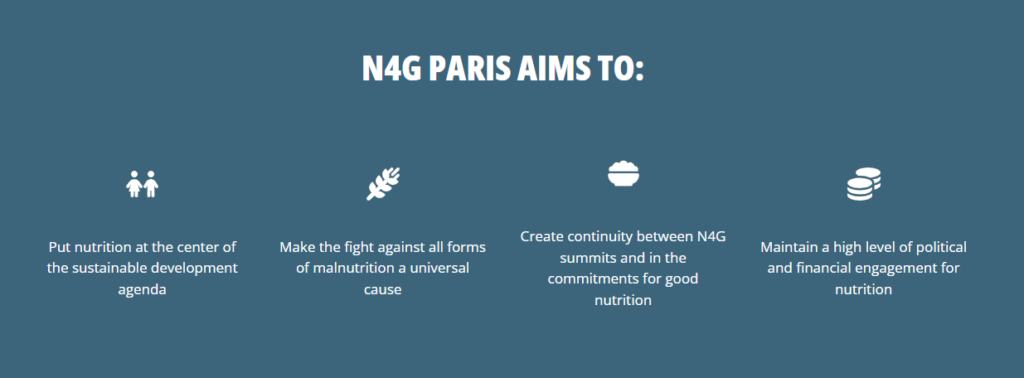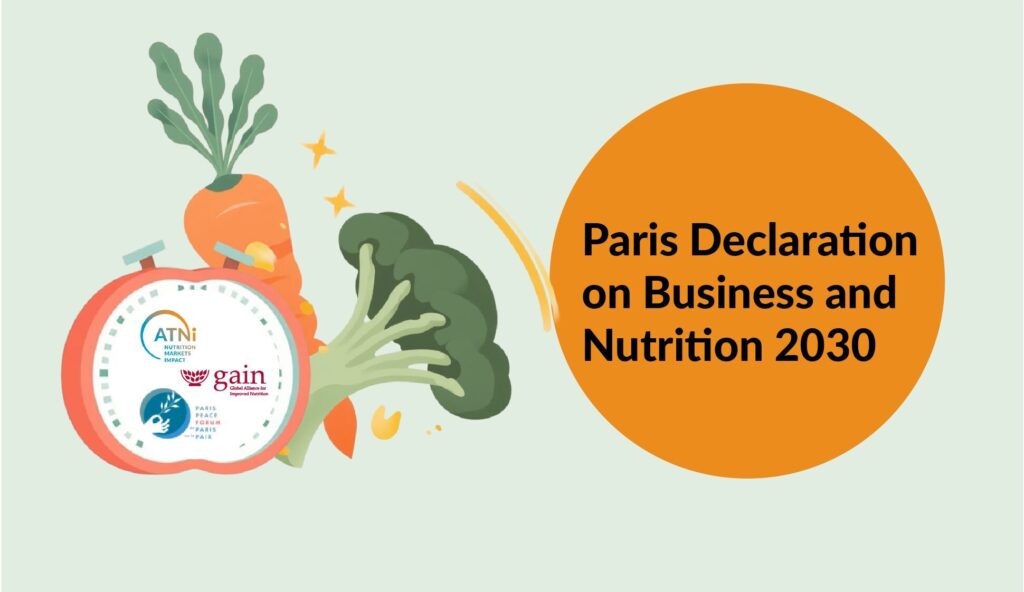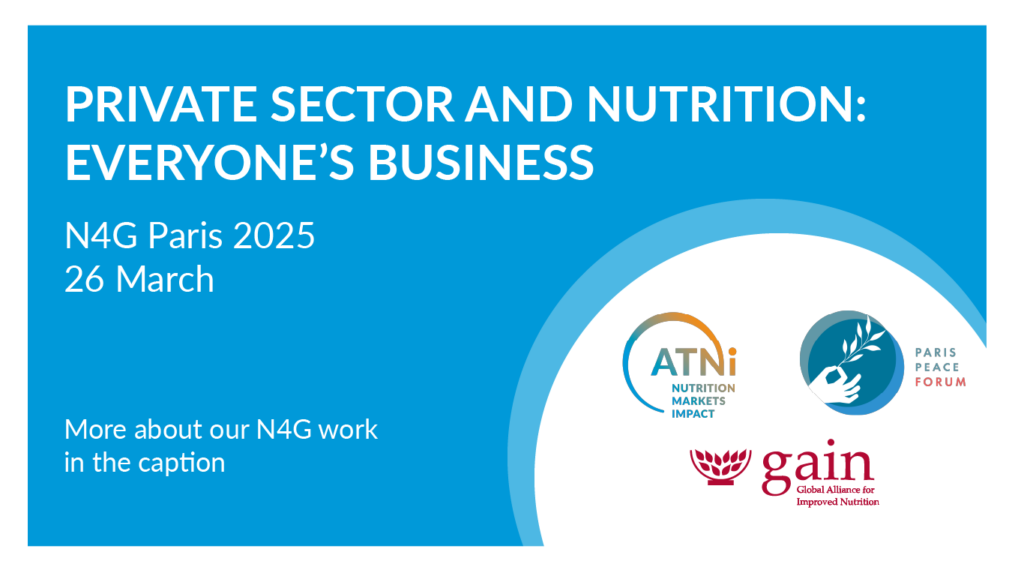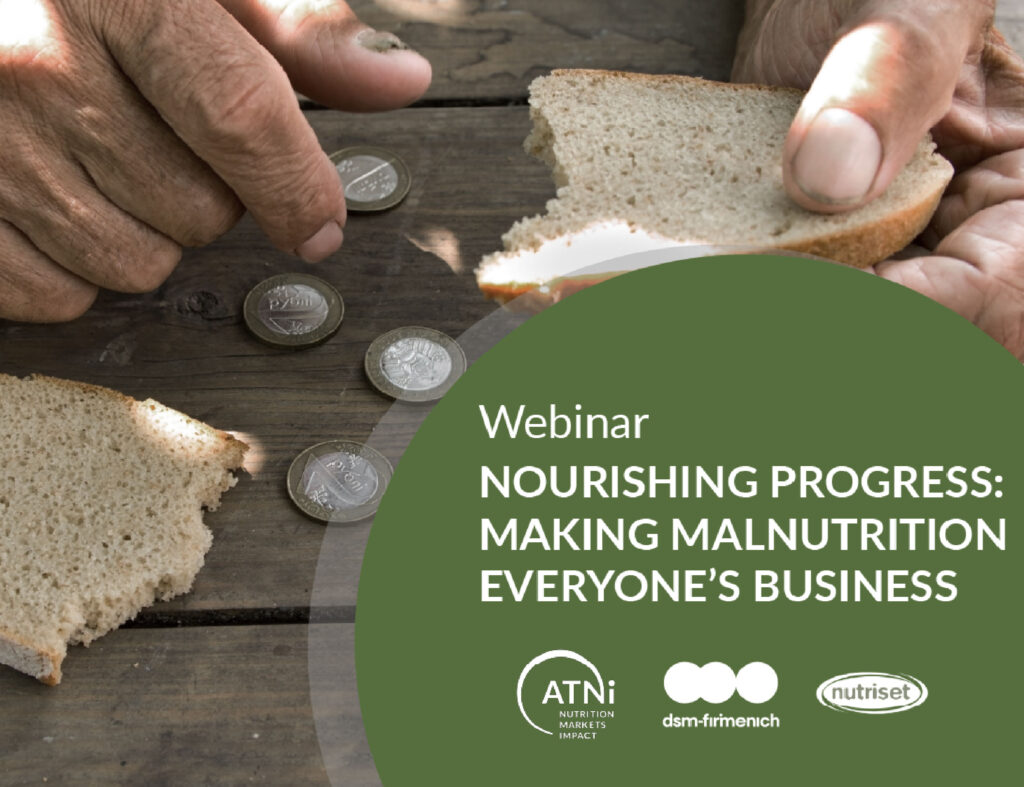
The Nutrition for Growth (N4G) Summit 2025
27-28 March 2025ATNi took part in N4G Summit 2025 in Paris as a facilitator in the International Advisory Group, an advisor to the Ministry of External Affairs of France, a co-chair of the Private Sector Working Group, an accountability mechanism supporting the GNR on private sector commitments, and a member of the Independent Expert Group.

The Nutrition for Growth (N4G) Summit 2025 is the flagship international conference on global nutrition, occurring every four years. It will take place in Paris on 27-28 March 2025, coinciding with the culmination of the UN Decade of Action on Nutrition. This critical event aims to accelerate global progress in ending malnutrition. As a global pledging platform, N4G Paris will inspire concrete commitments to ensure a healthier, more equitable future for all. Commitments will be submitted in the GNR Nutrition Accountability Framework.
The summit offers ATNi a vital opportunity to advance its mission to transform markets for nutrition.
ATNi is one of several formal partners engaged in the N4G process. As ATNi brings its expertise and network on finance and private sector accountability and engagement. We are involved in a catalysing role in many of the ongoing processes:
- As a facilitator in the International Advisory Group and an advisor to the Ministry of External Affairs of France;
- As a co-chair of the Private Sector Working Group, together with Paris Peace Forum and GAIN;
- As an accountability mechanism, supporting the GNR on private sector commitments;
- As member of the Independent Expert Group via our Executive Director Greg Garrett; and
- As a support to enable investors to engage and make pledges
The Private Sector Working Group (PSWG) is the Paris N4G’s primary interface with the private sector. It seeks to provide a platform for collaboration between public and private sector actors that prioritise impact and public health while recognizing the need to shape markets to improve nutrition outcomes.
The Independent Expert Panel on Nutrition (IEG) was formed by the Paris Peace Forum to identify and prioritize actions to improve global nutrition, in preparation for the Nutrition for Growth Summit in Paris in 2025. The panel is composed of globally recognized nutrition experts, acting independently, with the goal of synthesizing recommendations to accelerate progress on tackling malnutrition. The recommendations are designed to address the multiple facets of malnutrition, including poor growth during pregnancy and childhood, deficiencies in essential vitamins and nutrients, and overweight and obesity.

Led by ATNi, GAIN, and Paris Peace Forum, the Paris Declaration on Business & Nutrition 2030 establishes a shared vision for transforming food systems by realigning business incentives and investments.
Through progressive policies and accountability, it aims to strengthen the nutrition economy by 2030, ensuring businesses and financial institutions contribute to healthier food production, increased investment in nutrition-focused enterprises, and improved affordability and accessibility of nutritious options—ultimately fostering sustainable diets and better health outcomes for all.

ATNi, GAIN, and the Paris Peace Forum will host a high-level, invite-only event gathering leaders across sectors. Through plenary and thematic sessions, participants will assess progress since Tokyo N4G 2021, tackle challenges, and drive action. A key highlight will be the Paris Declaration on Business and Nutrition 2030, strengthening commitments to healthier, sustainable, and affordable food systems.
- Date: 26 March 2025
- Time: 10:00 – 17:00 CET
- Venue: Paris

Dsm-firmenich and Groupe Nutriset are organizing a webinar, which will bring together leading experts to explore how cross-sector collaboration and innovative public-private partnerships can accelerate progress against malnutrition. Featured speakers: Brieuc PONT, Virginia Villar Arribas,
Greg S Garrett, Anna H., Mauro Brero.
- Date: March 11, 2025
- Time: 2:00 PM CET
- The Nutrition Accountability Framework
- Tokyo Nutrition 4 Growth Pledges overview
- ATNi at the Tokyo Nutrition for Growth Summit 2021
- More and better financing for nutrition. Rebranding nutrition on the climb to the Nutrition for Growth Summit. Podcast by N4D (episode 19), with Brieuc Pont, Special Envoy on Nutrition and Secretary General of the Nutrition for Growth (N4G) Summit
- More and better financing for nutrition. What role for the private sector in nutrition financing? Podcast by N4D (episode 18), with Greg S. Garrett, Executive director of Access to Nutrition Index (ATNI).
- Global South Civil Societies Declaration ahead of the 4th Nutrition for Growth Summit, France, 2025. (in four languages)
- Africa’s renewed focus on nutrition will help build resilient and productive societies. Neema Lugangira, MP, Tanzania and ex-officio Lead Group member of the Scaling Up Nutrition (SUN) Movement.
- Strengthening N4G commitments across the nutrition data value chain. Webinar by the Micronutrient Forum and partners. Highlights and recordings available here.
For more information or for possibilities on partnerships, please reach out to Efi Chatzinikolaou, Head of Partnerships efi.chatzinikolaou@ATNi.org

